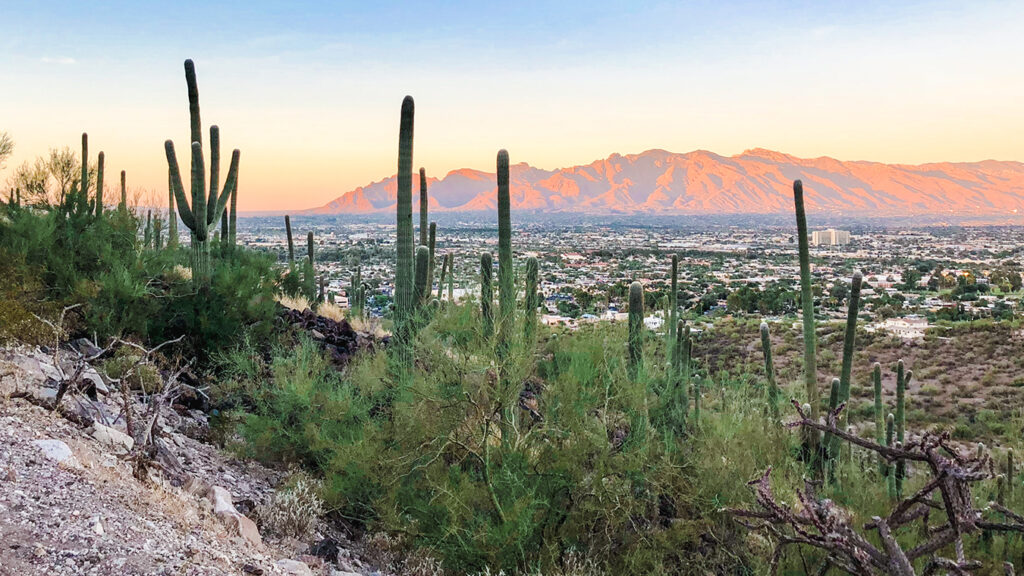Three School of Music faculty are part of a new international research effort focused on the human dimensions of climate change.
A first for College of Fine Arts faculty, this project is supported by the France–Arizona Institute for Global Grand Challenges, a partnership between the University of Arizona and France’s Centre National de la Recherche Scientifique (CNRS).
Sara Fraker, associate professor of oboe, is the principal investigator (PI) for the University of Arizona. Anne-Peggy Hellequin, professor of geography at the University of Paris Nanterre, is the French PI. School of Music Associate Professors Jackie Glazier and Yuanyuan (Kay) He are co-PIs, along with Larry Fisher, research professor emeritus from the School of Natural Resources and the Environment; and Adriana Zuniga-Teran, associate professor at the School of Geography, Development, and Environment.

Faculty lead global climate and sound study
The project, titled “Climate Change, Well-being and Soundscape,” explores how listening to the natural world can reveal how communities perceive environmental change. It also looks at how soundscapes, everyday sounds of the environment, affect well-being and help people cope with growing concerns about climate change.
This collaboration is one of five newly approved projects aim to develop innovative tools and models that tackle environmental change, public health challenges, and sustainable resource management. And it continues a trend of musical collaborations that explore the intersection of music and ecology.
“I continue to find inspiration in how we might, through music and sound, find more connection to the more-than-human world and become grounded in a sense of place and kinship with our desert home,” Fraker said.
How soundscapes influence place
This 2025 project will examine how residents of southern Arizona perceive ecological change through sound. The team is collecting field recordings, leading sensory walks, and creating original musical compositions. The goal is to explore how soundscapes influence place attachment, mental health, and climate awareness.
Fisher was one of the primary collaborators in the 2024 Watershed Soundscape project. He connected Fraker with a research observatory focused on understanding the complex interactions between humans and their environments. Pima County OHMi researchers were already conducting soundscape research.
“It was fortuitous that Jackie Glazier and I were able to use some of their field recordings in our (previous) performance project,” said Fraker. “Anne Sourdril, one of those French researchers, suggested … that I might serve as the Arizona PI on this project.”
The initiative pairs faculty and doctoral students from both countries, with funding for international travel and research exchange.
France-Arizona Institute for Global Grand Challenges
The University of Arizona partners with French National Center for Scientific Research, or CNRS, the premier research institution in France, which ranks in the top four academic institutions for research worldwide. Arizona was chosen by CNRS as its first International Research Center (IRC), CNRS’s highest level of institutional cooperation. The IRC program aims to bridge disciplines to advance and scale up transformative research and revolutionary solutions for sustainability and resilience.
Watershed Soundscape
Last year Fraker helped build a multidisciplinary team that was awarded the 2024-25 Annual Resilience Theme grant of $100,000, administered by the Arizona Institute for Resilience (AIR).
The team included once again, Fraker, He and Glazier, along with Carissa DiCindio, School of Art associate professor, Matthew Williams, associate professor in music education, and Neha Gupta, assistant research professor within AIR and the Department of Hydrology and Atmospheric Sciences.
Fraker and Glazier created a consortium concert series, featuring 19 ensembles from across the Santa Cruz River Watershed. These ensembles, including high school, community, and University of Arizona bands and orchestras, gave premiere performances of Sonoran Rivers, a new work by He and poet Alison Hawthorne Deming. The piece is based on the ecology and cultural history of the Santa Cruz Watershed, informed by streamflow data and local fieldwork.
The Tucson Symphony Orchestra presented marquee performances during its 2025 Young People’s Concerts. In all, the project reached audiences of over 19,000 community members and engaged 900 musicians of all ages.
Pine Chant
In 2021, Fraker used her Research, Innovation and Impact production seed grant to fund a collaborative project, “Pine Chant.” Fraker collaborated with dendrochronologist Margaret Evans at the Laboratory of Tree-Ring Research and Australian composer Lachlan Skipworth to commission “Pine Chant” (2021) for reed trio and electronics – performed by Fraker, Glazier and Associate Professor Marissa Olegario. The project was inspired by tree-ring data and climate crisis. The world premiere of “Pine Chant” took place at the Tree-Ring Lab with light design and art direction by Kelly Leslie, associate professor of art.
The piece was featured in “For The Wild,” an environmental justice podcast, the Arizona Republic, Arizona Daily Star, and won “Work of the Year – Chamber Music” at the 2023 Australian Art Music Awards.
